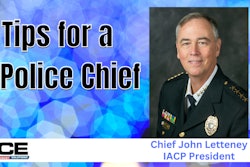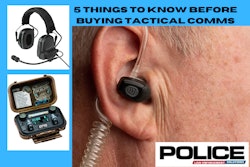Volunteers of America first created its Resilience Strength Training (ReST) program to help military veterans deal with moral injuries, but now the free online peer support sessions are available to first responders.
While many understand the impact of post traumatic stress disorder (PTSD) on veterans, police officers, and other first responders, that is totally different than moral injury.
Moral Injury
“Moral injury is a major identity crisis and disruption of a person's meaning system and values because of a catastrophic or accumulated stresses that break them,” explains Rita N. Brock, Ph.D., senior vice president and director of the Shay Moral Injury Center, Volunteers of America.
“It's not a mental health disorder I want to make that absolutely clear. Even the psychiatrists who study moral injury say it is not a mental health disorder, but it is an intense kind of suffering because you lose your sense of being a good person, you wonder who you are, or you think that who you are has become so awful nobody will love you again,” she adds
Brock says a mental health disorder is when your perception of yourself and reality don't match and you're feeling guilty about nothing or you're feeling shame about nothing. However, moral injury is much different. Take for example a veteran or an officer who has killed someone as part of their job.
“If you kill someone, you ought to feel awful. That's an appropriate response to reality. There’s data about veterans that veterans who have killed in combat are twice as likely to take their own lives as other veterans. So, there's real research and data on how difficult it is when people trained to kill, authorized to kill, doing legal work that is paid for by our government, do it. They feel horrible. They feel really awful,” she says.
Moral injury can impact police officers through their experiences, whether just one experience or a series of events. One example was provided to Brock by an acquaintance, a chaplain, in which an officer left the force after only one incident that caused moral injury. But that officer never shared his struggles until later.
“He didn't do anything in particular. He was on patrol, was on a highway, and drove up on a very bad traffic accident that had just happened. A car had rolled, and there was a person in the car upside down and the person was trapped in the car. There was no way to get him out without heavy equipment, and the car was on fire. He walked up to the scene and the man in the car started yelling, ‘shoot me, please shoot me,’ because he could tell the car was on fire,” Brock explains. “The policeman couldn't. So, he had to watch this man burn to death, while he waited for ambulances and fire trucks, and he said he just wished he'd shot him.”
He wouldn't have been sent to critical incident PTSD counseling because he wasn't involved in it, she says. He just was a witness but had to carry a moral injury as a result. There are other examples that are more common than this one.
“The obvious ones are when police are involved in shooting incidents and the ways that death is involved because even when it's lawful and you're protecting people, just human beings have a hard time killing.”
“What I keep saying is moral injury is intensely painful. It's a deep kind of suffering because you feel like in a high stakes situation something went wrong and you couldn't prevent it or you actually did what caused the harm,” Brock says. “Those feelings are not PTSD, because they're not fear based. They're really the feelings after something happens and you start thinking about it, you start to have these moral conflicts. Those intensely painful feelings are a sign that the good part of you wants to come back. But it won't come back if you keep pushing those feelings down and not paying attention to them.”
Creating ReST
Brock, who has been working in the moral injury study space since 2009, came on board with VOA about six years ago to work on setting up a moral injury processing program for miliary veterans. Previously she was researching and teaching about moral injury.
“I began to have a feeling like there weren't people doing very much around a recovery. There were a few little suggestions from some of the people who had been researching it and veterans. But I thought, you know, what if I pulled an expert team together, and we looked at what you could do for veterans that actually might make a big difference,” Brock says.
So, she convened a panel of eight experts, including Jonathan Shay, who was a Veterans Administration (VA) psychiatrist for 20 years. Brock describes Shay as “sort of the grandfather of moral injury studies.” Plus, one of his colleagues who had worked with the same group of veterans for 20 years joined the group. Several members of the panel were military veterans themselves. Also, a Zen priest and a ritual studies expert joined the team.
“The Zen priest and the ritual studies person really helped us think about the program not as therapy, but as a kind of stepped-out choreographed, ritualized process for changing people,” says Brock.
The team gathered for four solid days and put together an entire Post-it note wall full of all the ideas and then arranged them in the right order. Brock took on the job of creating a facilitator manual out of all of that, a script, and other supporting materials.
“The program really has had a lot of good input,” she says. “And then of course, we listened to the groups of veterans that went through it and made a few minor adjustments.”
Resilience Strength Training
VOA’s Resilience Strength Training (ReST) program began as a way to help military veterans process moral injury and other difficult life experiences that interfere with their ability to thrive and have satisfying lives.
The evidence-based pilot project, funded by a grant from Bristol-Myers Squibb Foundation, included a total of 95 veterans split between Los Angeles, CA, and New York City, NY. The first group met in early November 2017 and the last group took its final survey at the end of October 2019. Research results were published in 2020 in the Journal of Veteran Studies
“The program was tested with a higher risk population of veterans than college students or employed veterans, because a lot of them had been recently or chronically unhoused. And a lot of them had addiction issues. We had people who had been in prison. So, it was a higher risk population of veterans have benefited,” Brock says.
Around the time the data was released, the healthcare community was facing challenges. VOA launched online peer support for moral injury, distress, and resilience in June 2020, according to Stephen Samuels, vice president of innovation and impact investing at VOA.
“I would say that Rita (Brock) would agree with me, by this point the moral injury, moral distress vernacular, had begun to significantly escalate beyond the military and enter the healthcare workforce,” said Samuels. “Over time this vernacular, this definition, is moving into comparable industries and that brings us to the first responder population now.”
VOA took what was learned in the pilot program with veterans and expanded to serve those in healthcare facing moral injury during the COVID-19 pandemic. By the end of the summer of 2020, the Humana Foundation provided funding for VOA to scale the program larger.
Samuels says the HCA Healthcare Foundation then stepped forward to help expand further by supporting VOA|ReST 4 First Responders through a special fund. Now, the group peer support sessions are being offered to first responders at no cost.
Peer Support
VOA|ReST 4 First Responders considers first responders to be police officers, firefighters, EMTs, paramedics, emergency dispatchers, hospital emergency department staff, and first responder and hospital chaplains.
First responders can sign up for the online, confidential peer support sessions in a group format.
“I think what we're doing is completely different in that these are group sessions versus paired in a one-to-one session. This is somebody who you don't work with as the facilitator, and likely you're not going to know anybody in that meeting,” says Anne Foerster, VOA|ReST program manager. “It doesn't have to be related to an incident you just went through. It could be from 30 years ago, it could be something that's happening in your family life, it could be something that you're seeing happening in your department or with a coworker. And there isn't the risk of it getting reported further up, because it's not mental health treatment.”
Foerster says some of the repeat attendees are inviting friends, and then their friends are becoming repeat attendees. That's perfectly fine, she says. But there are some caveats around if someone attends a session and realizes that they're in there with a coworker, or a supervisor, and they don't want to be.
“We generally ask the higher-ranking person to sign up for a different session so that it truly can be anonymous,” she explains.
















